
Growing up, New York Times journalist Nikole Hannah-Jones only learned a little about the plight of Black people in America during Black History Month. The Pulitzer Prize-winning creator of the 1619 Project studied some usual suspects such as Harriet Tubman or Frederick Douglass, and then discussed slavery to cover the Civil War.
But then Black people like herself, she says, vanish from the narrative until the civil rights movement.
“There was no really larger understanding of how Black Americans fit into the larger story of America. And there certainly wasn't the teaching of Black people as actors in the American story."
For Hannah-Jones, this explains why white Americans don't know what it means "to be erased" from US history as well as broader American culture and literature.
"That erasure is really demeaning, and it's really powerful.”
Watch this episode of GZERO World with Ian Bremmer: Counter narrative: Black Americans, the 1619 Project, and Nikole Hannah-Jones
- US global reputation a year after George Floyd's murder; EU ... ›
- Nikole Hannah-Jones pushes back against "disqualifying" 1619 ... ›
- Breathing while Black: WaPo's Karen Attiah on racial injustice ... ›
- The Graphic Truth: Black representation in the US Congress ... ›
- The history of Black voting rights in America - GZERO Media ›
- The problem with China’s Zero COVID strategy | GZERO World Podcast - GZERO Media ›
- Pioneering Black American leaders in US foreign policy - GZERO Media ›
- How will the summer of 2024 be remembered in US history? - GZERO Media ›
- Yuval Noah Harari explains why the world isn't fair (but could be) - GZERO Media ›